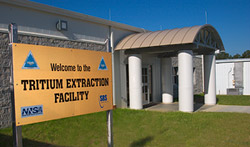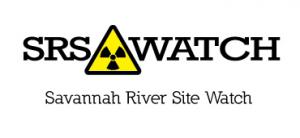DOE for First Time Rejects Defense Nuclear Facilities Safety Board Recommendation, On Safety of SRS Tritium Facilities

Tritium Extraction Facility at Savannah River Site; DOE Photo
DNFSB Raises Concerns about “Energetic Accident” Resulting in Exposure to Radioactive Tritium; DOE deems its Actions are “Adequate” and Rejects Recommendation
COLUMBIA, SC, USA, September 24, 2019 /EINPresswire.com/ -- Columbia, South Carolina – In an unprecedented move, the U.S. Department of Energy has for the first time rejected a recommendation by a highly respected DOE safety oversight board.
In a September 11, 2019 letter to the Defense Nuclear Facilities Safety Board (DNFSB), DOE’s National Nuclear Security Administration said it “does not accept” Recommendation 2019-2, Safety of the Savannah River Site Tritium Facilities, dated June 11, 2019.
“It is troubling to see that DOE has for the first time rejected a recommendation by a key oversight agency as it may indicate a growing unwillingness by DOE to accept safety board recommendations and properly respond to them,” said Tom Clements, director of Savannah River Site Watch (https://srswatch.org). “The DNFSB provides a valuable role in protecting worker and public health and safety at DOE sites and the recommendation concerning risks at Tritium Facilities at SRS merits acceptance and adequate response,” added Clements.
Citing the possibility of significant release of tritium the event of a “credible accident,” the DNFSB, which has raised numerous issues about safety of the SRS tritium facilities over the past few years, stated in its recommendation that
"The Board has concluded that adequate protection of public health and safety currently is not assured, should an accident, such as an earthquake or large fire, occur at these facilities and there continues to be a risk of exposure to significant radiological consequences in case of an energetic event at these facilities."
The DNFSB analysis further supports the conclusion above:
"The current situation at the Tritium Facilities does not adequately address either DOE’s standards of care or standards of practice as defined by its own requirements Consequently, adequate protection is not assured. The Board has concluded that DOE needs to take actions to improve the safety of the Tritium Facilities, upgrades to safety management programs and the implementation of robust controls to ensure adequate protection of public health and safety."
Contained in a lengthy analysis, the DNFSB made three recommendations to DOE “to mitigate the potential for high radiological consequences to individuals who would be impacted by a release from the Tritium Facilities.”
The NNSA response of September 10, 2019 affirms its efforts are “adequate” and that a new documented safety analysis (DSA), now nearing completion, “will strengthen that safety posture” of Tritium Facilities:
"In responding, I first want to assure you that DOE/NNSA remains fully compliant and committed in our duties to the American public in the safe operation of these facilities as outlined in the enclosure to this letter. These actions address the concerns of the DNFSB and reflect how DOE/NNSA is providing adequate protection of the public's health and safety at the Tritium Facilities at the Savannah River Site (SRS). Therefore, I do not accept Recommendation 2019-2."
"DOE/NNSA's safety programs and policies, and their effective implementation by our well-trained workforce, provide reasonable assurance that adequate protection of public health and safety is provided. Focused ongoing actions at the Tritium Facilities at SRS adequately address DNFSB concerns outlined in Recommendation 2019-2 and make the · need for additional actions in response to a DNFSB Recommendation unnecessarily duplicative of that effort, and would, therefore, detract from our continued progress…"
SRS Watch has confirmed that this is the first rejection by DOE of a DNFSB recommendation.
The mission of the DNFSB, a small independent agency established in 1988, is “to provide independent analysis, advice, and recommendations to the Secretary of Energy to inform the Secretary, in the role of the Secretary as operator and regulator of the defense nuclear facilities of the Department of Energy, in providing adequate protection of public health and safety at such defense nuclear facilities.”
The role of the board has recently come under attack by DOE, but public interest groups such as SRS Watch and groups affiliated with the Alliance for Nuclear Accountability (ANA) – an affiliation of public interest groups near DOE sites nationwide – have rallied to the defense before Congress of the board
SRS Watch and other groups in ANA have requested that the DNFSB now get involve in issue related to conversion of the canceled plutonium fuel (MOX) plant at SRS into a Plutonium Bomb Plant (PBP) to produce plutonium “pits” for nuclear weapons. “The safety board informed ANA that it is monitoring the situation with pit production but we think they should actively be involved as NNSA continues to push this risky new mission on SRS,” said Clements of SRS Watch.
Tom Clements
Savannah River Site Watch
+1 803-834-3084
email us here
Visit us on social media:
Facebook
Twitter
Legal Disclaimer:
EIN Presswire provides this news content "as is" without warranty of any kind. We do not accept any responsibility or liability for the accuracy, content, images, videos, licenses, completeness, legality, or reliability of the information contained in this article. If you have any complaints or copyright issues related to this article, kindly contact the author above.

